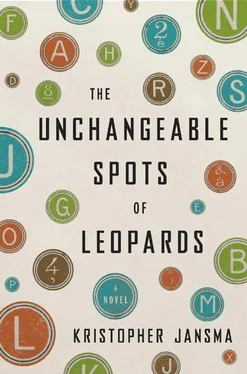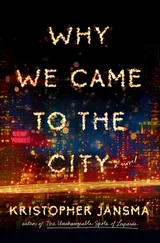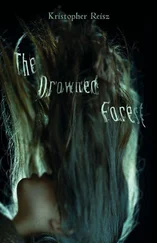“It’s oddly democratic,” Jeffrey continues. “No bishops and pawns and knights, with elite abilities to move this way or that. In checkers it’s only by cunningly avoiding capture — by hopping all the way across the board into enemy territory — that you can gain any real advantage. And all it is — here’s the brilliant bit — all being kinged is, really, is gaining the ability to reverse course. To go against the tide, as it were, back to where you’ve begun. See?”
I nod, just happy to see him finishing his thoughts. We play one game and then another, and as we begin the third we both become aware of a cinnamon-skinned man watching us from a nearby park bench. He wears dark shades and a black suit and sips from a soup bowl of green bouneschlupp. He is the only gentleman of color in the Place d’Armes, but what truly makes him conspicuous is his hair, which puffs out in a seventies-style Afro.
“Check out Mr. Black Panther,” I say.
“Think he’s an assassin?” Jeffrey teases.
“If he is, which one of us is he after?” I muse.
“Depends. Just what have you been up to these past ten years?” Jeffrey eyes me evenly as he captures my final packet and effectively ends the third game.
“Let’s go,” he says. “This guy weirds me out. ”
We move off toward the nearby flea market and Jeffrey seems a half ounce lighter. We peruse old coffeepots and empty picture frames. He dawdles for a bit by a used-book cart while I buy a collectible royal wedding stamp bearing a good likeness of the princess. She has her cascade of hair pinned up, which sets off her high cheekbones even more. But what, I wonder, is going on between them? I gaze into her stipple-inked eyes and try to hear the voices inside her head.
Jeffrey and I sit down on the edge of a large marble fountain, and I try to remember sitting beside her on a fountain years ago, running lines. ‘Love. What an idea!’ Now you say, ‘You don’t love him, then?’ and I’ll say, ‘But I won’t hear of any sort of unfaithfulness!’ Remember that.
“‘This fountain commemorates Luxembourg’s two national poets — Lentz and Dicks,’” Jeffrey reads. “That had to be a tough name to get through school with.”
I scowl slightly as Jeffrey reads on. “Mr. Lentz wrote the national motto. ‘Mir wëlle bleiwe wat mir sin’ … ‘We wish to remain what we are.’”
It really explains this strange place, I think, as Jeffrey considers the fountain. The gargoyles, the old men, the cobblestones. Maybe it’s trying with all its might not to change in any way. Maybe Luxembourg is stuck, just like us.
“You really think you’ve changed that much?” I ask.
Jeffrey stares down at the rippling fountain water and runs his hand through the gray streaks above his ear again. “Most days I hardly recognize myself.”
He watches the flecks of ash from his cigarette fall off and drift down to the water. I am about to accuse him of being melodramatic when a sudden slant of light catches my attention. I look up and see, not far away, that the young woman working at the used-book cart is standing with her sleek cellular phone aimed right at us. She grins and lifts a book off the stack in front of her. Näischt Helleges the title reads, and beneath it is a familiar black-and-white photograph.
“Well,” I say to Jeffrey, “ somebody recognizes you.”
• • •
Jeffrey refuses to go back to the hotel even after I remind him that we’ve checked in as Timothy Wallace and Anton Prishibeyev. “They’ll know we’re staying there!” he shouts, and when I try to ask him who “they” are exactly, he rushes off in the other direction, fleeing the park and leading us southward through town, dodging up and down alleys and over bridges, all the way to the Place de la Constitution at the edge of the Old City. But the area around the monument is packed with sightseeing buses and camera-clutching tourists. Panicking, Jeffrey bolts down a set of stairs and descends into the deep and verdant Petrusse Valley.
These stairs take us all the way to the bottom of the chasm, which circles the ancient fortress walls of the Old City, which had kept Luxembourg snug and secure for nearly ten centuries before tanks and planes had come along and ruined all the fun. Down here, Jeffrey rushes along a jogging path until he reaches a little raised outpost — a forward fortification of some kind, now topped with empty park benches.
Wheezing, Jeffrey slumps against the balustrade and looks hatefully out at the wide Petrusse Valley beyond. It’s only then that he notices that there are hundreds of pigeons, fat and gray, swarming beneath the benches, feasting on gingerbread crumbs. Jeffrey covers his mouth as he staggers upwind, nervous about the molted feathers that hang in the air. I want to rush over and pull him back, but I stay by the edge, looking up at the Place de la Constitution above us. In its center is a great obelisk that commemorates the Luxembourgers who died in the Great War. At the very top of the monument is a gilded statue of a woman, hovering angelically with a wreath in her hands. From down in the valley, it looks as though she’s floating in thin air.
“Come on,” I say. “Let’s just go back to the hotel. So you have a fan! It’s not exactly the end of the world.”
Jeffrey just shakes his head. “You don’t know what it was like. You weren’t there when things got really bad. That Haslett asshole kept on calling, and then Iowa, and whenever I went out, there’d be someone just staring at me. It was like I could see my words there in their heads. Crawling there on the undersides of their foreheads. It was like they thought I knew something. And they always ask me, Is it true? Is it true? Did it really happen? And then… What’s next? What are you working on now? All of these… these… these—”
“Expectations?” I finish for him.
He nods and I can hear the crinkle of the aluminum beneath his seeking fingers. When he finally gets a cigarette out, it shakes in his hand so badly that he drops it. I pick it up for him, blowing on it to get the Luxembourg off. He throws it back to the ground again.
“Where the hell did you go?” he demands.
I chew my lip and finally say, “I wish I hadn’t.”
Jeffrey takes another cigarette out and this time hands me the lighter. Then he leans in and I shield the flame.
So then I tell him where I went. I tell him about New York and Timothy Wallace and Dubai. Jeffrey laughs, hardly able to believe me — except that he saw the passport I used to check in to the hotel. I tell him about meeting Tina, his old junior editor, on the train in Sri Lanka, and I’m surprised at myself — how sad it still makes me to talk about her. I tell him about the way the Tamil boy read Nothing Sacred until they tore him from it. He stops fidgeting at this — to hear that his life preserver buoyed someone else, some total stranger, a world away and mixed up in a war started by this boy’s grandparents before he or I or Jeffrey was ever born. Last, I tell him about Jeremiah and the biography I never finished, and here he becomes furious, as I knew he would, but he can’t walk away without knowing the end. As I take him through it — my double, the leopard, the writers’ colony — his fury fades to anger, and then to mere annoyance. When I finish, he peers up at the golden lady and then out at the flock of pigeons, which continues to cruise, like one creature with a thousand legs, all around the park benches. I play awkwardly with the lighter. Jeffrey does not seem agitated anymore but it is hard to tell. His is still a mind I cannot see into.
Then, finally, he says, “I’ll flip you for it.”
Читать дальше











